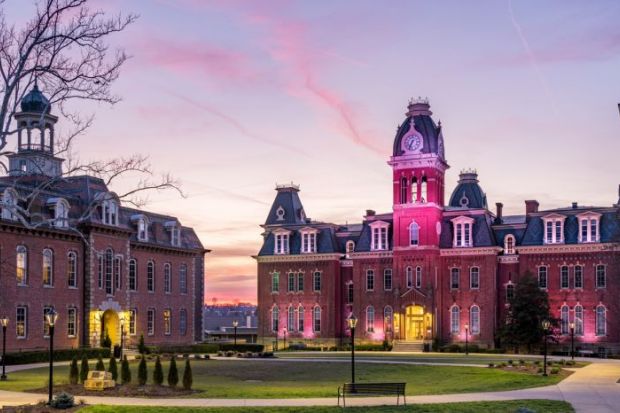Academics at West Virginia University have overwhelmingly backed a vote of no confidence against the institution’s president, Gordon Gee, and demanded an end to severe cuts to programmes that are seen as a post-Covid harbinger for much of US higher education.
Acting in a case that has raised alarm among academics across the country, the WVU faculty voted 797 to 100 against Dr Gee – an iconic figure known for a long career of multiple university presidencies – after he pushed a plan to cut 16 per cent of WVU’s full-time faculty, 9 per cent of its majors and all of its foreign language programmes.
WVU is the largest university in one of the poorest states in the US. It faces a budget shortfall of $45 million (£36 million) that is expected to reach $75 million within five years, owing to factors that include declining enrolment, Covid-related operational slowdowns and extensive construction debt.
The faculty resolution against Dr Gee accused him of poor planning and management, and expressed doubt in his “ability to responsibly, honestly and effectively lead, facilitate and participate in decision-making”.
Dr Gee pushed back, listing for the faculty ahead of their vote some accomplishments that include moving WVU into the rank of R1, the group of about 150 universities in the nation’s top tier of research activity.
The president largely dismissed the faculty complaints and pleaded for time to show that his restructuring plan was necessary. “I must say that if I had done all of those things, I’d probably vote no confidence myself,” he quipped to the professors.
The faculty also approved a resolution asking the university to halt the ongoing cuts in academic programme and faculty positions.
The university later issued a statement from Taunja Willis-Miller, a health industry lawyer who serves as chair of the WVU board of governors, saying that the board acknowledged the votes but “unequivocally supports the leadership of President Gee and the strategic repositioning of WVU”.
The board “rejects the multiple examples of misinformation that informed these resolutions”, Ms Willis-Miller said. “The university is transforming to better reflect the needs of today, and we must continue to act boldly. President Gee has shown time and again he is not afraid to do the difficult work required.”
The faculty had defeated a no-confidence resolution in 2021 against Dr Gee, a 79-year-old president a decade into his second tenure as WVU president. He also has led Ohio State University twice, as well as Brown University, Vanderbilt University and the University of Colorado at Boulder.
The WVU governing board gave Dr Gee a one-year extension last month, and he said he would leave the presidency after that. The board is due to vote later this month on the retrenchment plan.
Many public universities across the US are facing similar kinds of pressures, largely traced to decades of declines in taxpayer investment – reflecting a longstanding belief among many on the political right that higher education often does not serve their partisan interests.
The University of Florida’s new president, former Republican US Senator Ben Sasse, recently talked to his faculty of seeking a 30 per cent reduction in the number of academic departments. Republican lawmakers in Wisconsin recently approved $32 million in cuts for their state university system, including a $7 million reduction for its esteemed flagship, the University of Wisconsin-Madison.
In some cases, the cuts have political motivations, with conservative lawmakers in multiple states that include Florida, Wisconsin and Ohio saying they want to punish institutions for pursuing policies to advance diversity.
The WVU developments have generated protests well beyond the state, in part because Dr Gee hired a consulting company, rpk Group, that has worked with public universities in other states – including Missouri, Kansas and Virginia – to downsize their operations.
Critics include at least 20 foreign language faculty at George Washington University, who rejected arguments by WVU leaders that GW is among several institutions that have eliminated language requirements for graduation. Ending language courses at West Virginia, the GW faculty argued, “is a dangerous plan that will leave WVU’s students less competitive in the job market and with narrower opportunities to develop their careers”.
Register to continue
Why register?
- Registration is free and only takes a moment
- Once registered, you can read 3 articles a month
- Sign up for our newsletter
Subscribe
Or subscribe for unlimited access to:
- Unlimited access to news, views, insights & reviews
- Digital editions
- Digital access to THE’s university and college rankings analysis
Already registered or a current subscriber? Login








